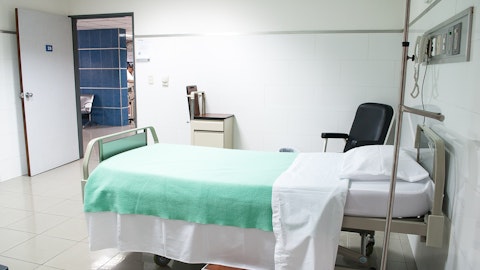Ramy Tadros : Yes. We’re not really — it’s Ramy, here John. We’re not really seeing any of those having any kind of material effect on our book of business. And remember, we’re not in the major medical we’re not providing Rx. We are group life players and none of that is really having any material impact at this point.
John Barnidge : Thank you.
Operator: And our next question is from Mike Ward with Citi. Please go ahead.
Mike Ward : Thanks guys. Good morning. I was just wondering if you could comment on the trends in Asia. It seems like the economy in Japan at least is reengaging or reopening. So any thoughts on maybe the near-term outlook there?
Lyndon Oliver : Hey, Mike it’s Lyndon here. So just as we look at broadly Asia, I’ll just comment on sales and then maybe we can getting Japan more specifically. Overall, we’ve had a very strong quarter and year-over-year sales continue to be very strong. We’ve seen a 5% growth overall and in Japan 3%. In Asia, in total we’ve been up 8% and that’s driven broadly between Korea and China. If we look at the economy in Japan, it is really strong but our sales are primarily driven by interest rates. And so the stronger interest rates have really helped us. So as long as that continues, we think we’ve got a really solid platform on which to leverage the higher sales.
Mike Ward: Thanks. And then, maybe just could you guys maybe speak to your appetite, specifically for inorganic growth in the US around voluntary benefits that would be helpful. Thanks.
Michel Khalaf: Hi Mike. It’s Michel. So, as I mentioned earlier, whereas we don’t see any gaps when it comes to our Group Benefits business here. We’ve been growing voluntary at — in the high-teens for a number of years. The employee paid component of our sales is also growing. We’re always open to do something inorganically, if we feel that it fits strategically, if it adds the capability, if it helps us accelerate revenue growth, provided it is accretive over time and provided it also compares favorably to other potential uses of capital. So whereas there are no gaps, we have M&A as a strategic capability here and we’ll deploy it as we believe it makes sense to do so. And if it’s a better use of capital compared to other potential uses.
Mike Ward: Thanks Michel. Maybe just one follow-up on that. Is capesize something that makes you consider or not consider M&A in group overall?
Michel Khalaf: Meaning, Mike, you’re referring to sort of deal size?
Mike Ward: No, sorry, like the target market employer size?
Michel Khalaf: I mean not really. I mean I would say, we have scale across our businesses and across markets. It’s more around does one plus one equal more than two, if you like in terms of what we have and what we are potentially acquiring.
Mike Ward: Okay. Thank you.
Operator: And we will turn the conference back to John Hall.
John Hall: Great. Thank you everybody for joining us on this very busy morning for insurance earnings and have a nice day. Thank you.
Operator: Ladies and gentlemen, that does conclude your conference for today. Thank you for your participation. You may now disconnect.
Follow Metlife Inc (NYSE:MET)
Follow Metlife Inc (NYSE:MET)
Receive real-time insider trading and news alerts





